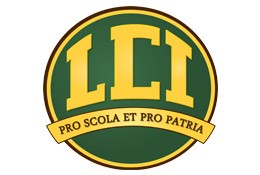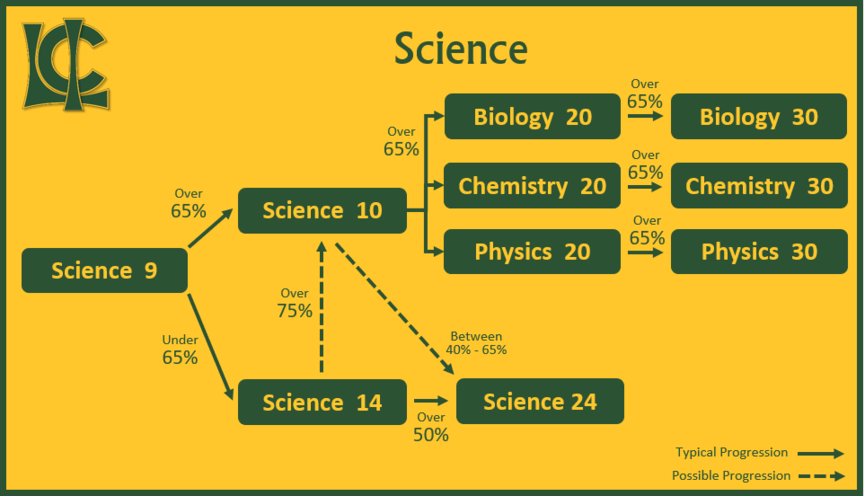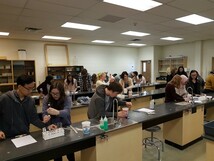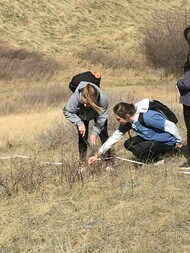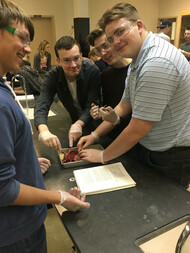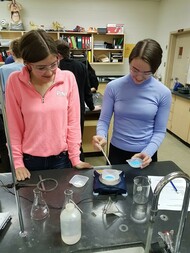The philosophy and rational for the Alberta Science Program of Studies states that students graduating from Alberta schools require the scientific and related technological knowledge and skills that will enable them to understand and interpret their world and become productive members of society. They also need to develop attitudes that will motivate them to use their knowledge and skills in a responsible manner. Science programs provide opportunities for students to develop knowledge, skills and attitudes that they need to explore interests and prepare for further education and careers. At the Lethbridge Collegiate Institute science teachers strive to provide students with learning experiences that enable them to experience science in ways that are respectful of the inquiry process and allow them to construct meaning of the world in which they live. A primary goal of science education at the LCI is to enhance scientific literacy and prepare students for post-secondary programs.
Science 9 (non credit course)
- Discusses chemistry, biology, physics, environmental science and space exploration
- Completing science 9 successfully allows students to take an academic focus in grades 10-12 if they so choose
- It is strongly recommended that students earn a grade of 65% or higher in Science 9 and Math 9 in order to be successful in high school science courses
In high school science courses, students develop scientific knowledge through collecting, analyzing and interpreting experimental evidence. Connections among science, technology and society are also explored.
Prerequisites: 50% minimum is required to progress to the next level in a sequence
65% at least is recommended in order to have success throughout science programming
Science 10 (5 credits)
- introduces biology, chemistry, physics and global energy systems
- allows you to choose from Biology, Chemistry, Physics and/or Science at the 20-level, depending on your interests, abilities and goals
Science 20 (5 credits)
- Science 20 offers a comprehensive exploration of biology, chemistry, physics, and environmental science, expanding on the concepts covered in Science 10. Through hands-on experiments and inquiry-based learning, students delve into cellular biology, genetics, chemical reactions, motion, energy, and environmental issues. By fostering critical thinking and scientific literacy, this course equips students with the knowledge and skills necessary to understand the natural world and engage in informed decision-making. Science 20 prepares students for further study and empowers them to become active contributors to scientific advancements and environmental sustainability.
Science 30 (5 credits)
- Science 30 delves into advanced concepts in biology, chemistry, physics, and environmental science, aligning with the concepts of Science 20. Students explore genetics, organic chemistry, mechanics, and environmental sustainability through laboratory experiments, research projects, and critical analysis. By delving deeper into the complexities of the natural world and engaging in interdisciplinary inquiry, students develop the skills and knowledge necessary for success in post-secondary education and careers in STEM fields. Science 30 empowers students to become informed citizens and innovative leaders, ready to address pressing global challenges and contribute to scientific advancements and environmental sustainability. The course culminates with a Diploma Exam and can be used to meet university entrance requirements.
Scimatics 10 (15 credits)
Prerequisite: 80% in both Science 9 and Math 9
- a rigorous year-long course which integrates Science 10, Mathematics 10C and Chemistry 20
- accelerated learning for students who enjoy an academic challenge and the sciences
- students explore the interrelatedness of science and math disciplines
- focuses on mastery learning, inquiry learning, and project based learning
BioSci (10 credits)
- a year-long course which integrates Science 10 Biology 20
- focuses on mastery learning, inquiry learning, and project based learning
*When possible, Scimatics and BioSci may be team-taught for two units (physics and biology) in order to provide student with meaningful opportunities for collaboration, and to increase cross-curricular learning opportunities
Biology 20, 30 (5 credits each)
- engage in examining interactions of living systems with each other and their environment
- Biology 20 emphasizes energy and matter exchange
- Biology 30 focuses on adaptation and change in biological systems as well as genetics and DNA
Chemistry 20, 30 (5 credits each)
- engage with the study of matter and its changes in the natural and industrial worlds
- Chemistry 20 emphasizes the structure and behaviour of matter (chemical bonding, gases, solutions, and quantitative relationships in chemical change)
- Strongly recommend Mathematics 10C as a prerequisite
- Chemistry 30 focuses on changes of matter and related energy changes (organic chemistry, thermodynamics, electrochemistry, equilibrium)
- Strongly recommend Mathematics 20 as a prerequisite
Physics 20, 30 (5 credits each)
- engage in the exploration and analysis of the interactions between matter and energy
- understand the physics behind natural events and technology
- Physics 20 emphasizes mechanics including kinematics, dynamics, energy, and waves
- Strongly recommend Mathematics 10C as a prerequisite
- Physics 30 focuses on mechanics, electricity and magnetism, and the nature of matter (the atom and the nucleus)
- Strongly recommend Mathematics 20 as a prerequisite
Science 14, 24 (5 credits each)
- general sciences
- apply scientific knowledge and skills to everyday experiences
- combined program where students earn 10 credits for both courses in one semester in order to fulfill minimum requirement for high school diploma

